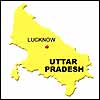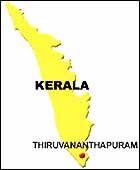|
|
| Oh Kolkata?: Bengal's Communist lineage
scares investors, and Kolkata's a mess; but the state has stepped
up its marketing |
In
June this year, a group of NRIs and other potential investors packed
a room at the Marriott Financial Centre in the heart of New York
city. Their object of attention, however, wasn't either Chandra
Babu Naidu, Chief Minister of Andhra Pradesh, or S.M. Krishna, his
counterpart from the neighbouring state of Karnataka. Rather, it
was a plump woman with short hair-Uttar Pradesh Chief Minister Mayawati.
Unusually, the 47-year-old cm was leading a high-level team from
her administration to Europe and the US to attract investment into
the state. After a forceful powerpoint presentation titled "Maya's
Vision", Mayawati painstakingly assured her audience that her
government was stable and that there were no threats to its survival.
She spoke too soon. Barely three months later, in August end, not
only did her 18-month-old government fall after coalition partner
Bharatiya Janata Party (BJP) withdrew support, but Mayawati also
quit the state assembly.
| FACT SHEET |
 AREA:
89,000 sq km AREA:
89,000 sq km
POPULATION: 80.2 million
STATE DOMESTIC PRODUCT: Rs 1,43,411 crore
PER CAPITA INCOME: Rs 18,021
ROADS: 57,600 kms
POWER: 6,877 MW (installed capacity)
MAJOR INDUSTRIES: Engineering, automobiles, chemicals and fertilisers,
jute, tea, IT, electrical and electronics |
But that's UP at its political best. In the
past 10 years, up has had as many ministries, projecting the image
of a state in constant turmoil, and hampering private investment.
"UP politicians have failed to project a good image of the
state," notes Sudhakar Tiwari, a Lucknow-based former senior
executive of Indo-Gulf Fertilisers and currently a consultant to
the company.
And image, as the survey unequivocally reveals,
is perhaps more important than the actual availability of infrastructure,
since a poor perception directly affects a state's chances of making
it on an investor's shortlist. There are two more states, besides
UP, that exemplify this statement: Kerala and West Bengal. In terms
of their factual ranks, which are based on hard metrics of infrastructure
availability, the three states are among the top 10. West Bengal
is at a surprisingly high of six, Kerala at nine, and UP at 10.
Excepting Kerala, the states have even moved up in overall rankings-UP
from 19 to 15 and West Bengal from 13 to 11. But look at how poor
the investor perception is: Kerala comes in at 24, West Bengal just
below it, and UP barely two notches above the survey's consistently
bottom-most state, Bihar.
|
|
| Let down by politicos: UP's the biggest
of them all, and the most fragile; its Greater Noida, though,
is a big draw |
The poor perceptual ranks are not without reason,
though. Kerala and West Bengal are probably the last two bastions
of Communist governments and are notorious for their militant trade
unions, although the reality is that few strikes have taken place
in these states in the last several years. As for UP, businesses
hate the lack of continuity in political leadership. Worse, every
time a new cm takes over, he or she feels obligated to overhaul
the bureaucracy, too. For businesses chasing approvals and seeking
a common face to the government, that's a nightmare. "When
the new officers come in, they hardly follow up on the plans of
their predecessors. They tend to start afresh," admits a top
bureaucrat in UP.
The result: halting investment. In the last
three years, UP has received just Rs 6,529 crore in private and
foreign direct investment-one of the lowest in the country. Kerala
has not managed any private investment worth mentioning (interestingly,
Kerala State Industrial Development Corporation and the industries
ministry do not have any figures readily available), while West
Bengal has done surprisingly better with Rs 12,260 crore. Laments
Somnath Chatterjee, Chairman of West Bengal Industrial Development
Corporation: "There's such a lot of good work being done here,
but only the negatives get highlighted."
| FACT SHEET |
 AREA:
2,94,000 sq km AREA:
2,94,000 sq km
POPULATION: 166 million
STATE DOMESTIC PRODUCT: Rs 1,64,630 crore
PER CAPITA INCOME: Rs 9,765
ROADS: 1,84,000 kms
POWER: 6,159 MW (installed capacity)
MAJOR INDUSTRIES: Sugar production, handloom, cotton & woollen
textiles, leather & footwear, distilleries, and breweries |
Needed: A Makeover
Chatterjee has a point. It's not that the three
states are caught in a time warp. UP, for instance, is stepping
up on its infrastructure investment. Recently, the state received
a $488-million (Rs 2,238 crore) World Bank loan, which it will use
to widen and improve some 2,800 kilometres of roads. It is also
adding 1,420 mw to the existing capacity in the public sector. Says
Vijay Sharma, Principal Secretary (Power): "Industry need not
worry about the availability of power." Partly based on that
promise, Samsung Electronics India chose to open early this month
a $25-million (Rs 114.6 crore) refrigerator manufacturing facility
in Noida and not Delhi's other bustling suburb of Gurgaon. Says
the company's Director, Ravinder Zutshi: "Noida offers better
power and infrastructure facilities than Gurgaon."
The two communist-ruled states are also quietly
wooing industry, and if they aren't any more aggressive it's because
they have their political planks to protect. They can't be seen
as overtly industry-friendly-a reason why West Bengal cm Buddhadeb
Bhattacharya is calling the state's disinvestment programme "joint
venture transformation". Says the Industries and Commerce Minister,
Nirupam Sen, referring to West Bengal's gain in overall ranking:
"It's only in 1994 that we embarked on our new industrial policy
and it is already bearing fruit." The new priority, according
to Sen, is image management and greater marketing push-more roadshows,
more business delegations, and more media briefings.
|
|
| Sleeping Buddha: While Kerala has set
up technology parks like this one in Thiruvananthapuram, its
pace is unhurried |
Meanwhile, Kerala cm A.K. Antony is taking his
first steps towards wooing investors. Early this year, the state
held a Global Investor Meet in Kochi. It is said to have attracted
investment intentions worth Rs 26,000 crore. Memoranda of understanting
(MoUs) for 96 projects worth Rs 11,160 crore were signed immediately
after the conference, and those included a private airport at Kannur
from the Leela Group, an amusement park and ropeway at Thiruvananthapuram,
an information technology (it) city in Kochi, and proposals from
several it companies such as Microsoft, Infosys, and Tata Consultancy
Services. Says C.J. George, Managing Director, Geojit Securities,
a leading stock-broking firm based in Kochi: "Even the Marxists
(in Kerala) have become investor-friendly."
Yet, how genuinely and effectively the states
court investors will determine their future growth. In UP, for instance,
Rajive Kumar, an IAS officer and an alumnus of Harvard's Kennedy
School of Government, has been given the task of spreading industrialisation
evenly through the state. On his part, he's doing the job diligently.
Kumar's nondescript office near Mayawati's residence in Mall Avenue
has no security guards and no front office, and visitors can walk
right through to his room. But just how long Kumar, who was the
MD of upsidc before taking over as Secretary (Industrial Development),
stays on in the job is anybody's guess.
| FACT SHEET |
 AREA:
38,863 sq km AREA:
38,863 sq km
POPULATION: 31.8 million
STATE DOMESTIC PRODUCT: Rs 69,602 crore (2001-02 at current
prices)
PER CAPITA INCOME: Rs 21,310
ROADS: 1,37,678 kms
POWER: 2,600 MW (installed capacity)
MAJOR INDUSTRIES: Tourism, IT, rubber, healthcare, mineral-based
industries |
In other states like West Bengal, the problem
maybe of pace. While some industry captains like Harshvardhan Neotia
of Ambuja Cement feel that serious investors would look at fundamentals
and not perception, others like RPG Enterprises' Vice Chairman Sanjiv
Goenka agree that perception is important. "Kolkata as the
state capital has to be showcased as a thriving metropolis; the
city should be illuminated, roads improved, and hawkers and other
squatters removed," says Goenka, who otherwise is a die-hard
Kolkatan.
Similarly, while Kerala has defanged its infamous
"headload" workers (read manual coolies) through a legislation
six months ago, there's very little local entrepreneurship. Says
Nissim Mannathukkaren, a researcher on Kerala at Canada's Queen's
University: "The blame does not lie on labourers alone. There
are also not enough risk-taking entrepreneurs." Agrees Rajeev
Chandrasekhar, whose BPL is one of the rare successful Malayalee-founded
groups: "Local entrepreneurship never really took off."
Maybe for that reason alone Kerala-and the
others-should learn to market their states harder.
|
